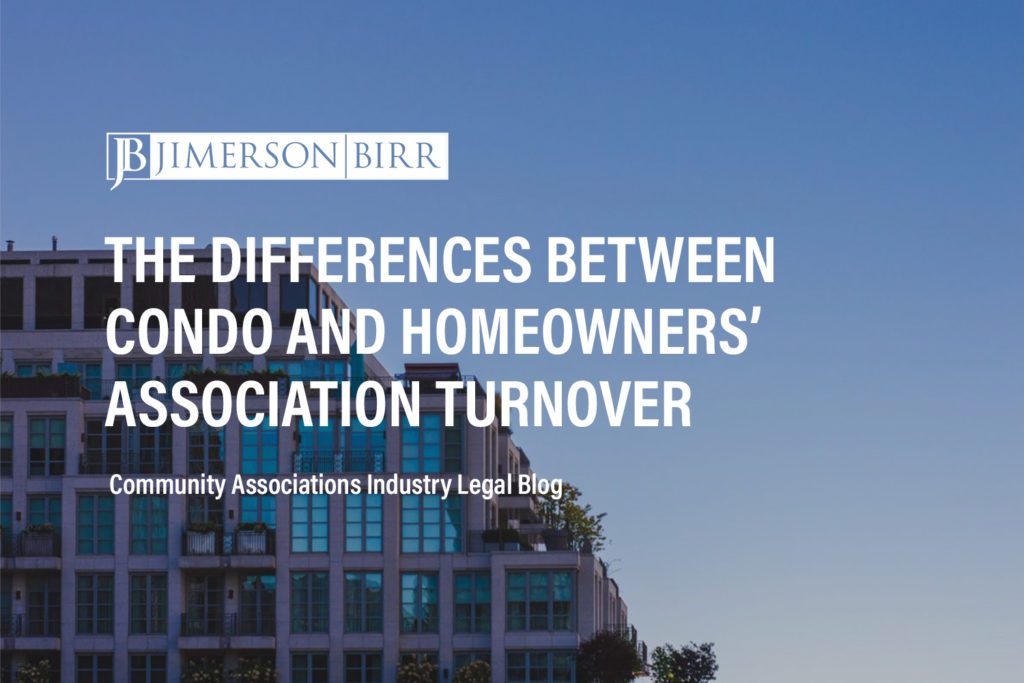Previously, I published a blog reviewing when turnover occurs for a homeowners’ association only. At first blush, one may conclude that condominium associations and homeowners’ associations would have the same or nearly identical requirements for when turnover occurs. However, the truth is quite opposite. Florida condominium association are governed by Section 718, Florida Statutes compared to Florida homeowners’ associations, which are governed by Section 720, Florida Statutes. With that being said, Chapter 718 is more rigid on Condominium Associations compared to the statutory requirements for Homeowners’ Associations under Chapter 720 and imposes different time periods for when turnover of a Condominium Association may occur.
Remember, turnover is just the transfer of association control from the developer to non-developer owners. In essence, this is when the non-developer owners gain majority control (fifty-one percent (51%)) of the condominium association’s board of directors. Chapter 718.301, Florida Statutes controls turnover for condominium associations. First, unit owners obtain a minority board representation on the association when non-developer own fifteen percent (15%) or more of the condominium units in the community. At this point, the non-developer owners are entitled to elect at least one-third (1/3rd) of the members of the condominium association’s board of directors.[1] This occurrence is the beginning of non-developer representation on the condominium association’s board of directors.
For a condominium association, turnover officially occurs upon the first of any of the following events:
- Three (3) years after fifty percent (50%) of the units that will be operated ultimately by the association have been conveyed to purchasers;
- Three (3) months after ninety percent (90%) that will be operated ultimately by the association have been conveyed to purchasers;
- When all the units that will be operated ultimately by the association have been completed, some of them have been conveyed to purchasers, and none of the others are being offered for sale by the developer in the ordinary course of business;
- When some of the units have been conveyed to purchasers and none of the other are being constructed or offered for sale by the developer in the ordinary course of business;
- When the developer files for petition seeking protection in bankruptcy;
- When a receiver for the developer is appointed by the court and is not discharged within thirty (30) days after such appointment, unless the court determines within thirty (30) days after appointment of the receiver that transfer of control would be detrimental to the association or its members; or
- Seven (7) years from the date of the declaration.[2]
To break this down, turnover occurs at the earliest of any of these instances –
- 3 years after 50% of the units are sold;
- 3 months after 90% of the units are sold;
- The developer essentially abandons the condominium;
- The developer holds “phantom units” – essentially the developer has sold some units, but is holding units that have never been constructed or offered for sale;
- Developer goes bankrupt or a receiver is appointed; or
- 7 years after the date of the declaration.
The Florida Condominium Act places a hard deadline for turnover for seven years from the date of the declaration at the latest. The Florida Homeowners Association Act does not have a similar provision.
Although turnover may occur, similar to homeowners’ associations, it does not mean that the developer is entirely out of the picture. The developer is entitled to elect at least one (1) member of the board of directors so long as the developer holds for sale in the ordinary course of business:
- At least five percent (5%) of units in condominium with less than 500 units; or
- At least two percent (2%) of units in condominiums with more than 500 units.
After turnover occurs, the non-developer owners have majority control over the board of directors, and the developer may exercise the right to vote as a unit owner for all of the developer-owned units in the condominium in the same manner as any other unit owner. However, the developer cannot use its votes to try and reacquire control of the association or select the majority members of the board of directors.
[1] 718.301(1)
[2] 718.301(1)(a)-(g)

